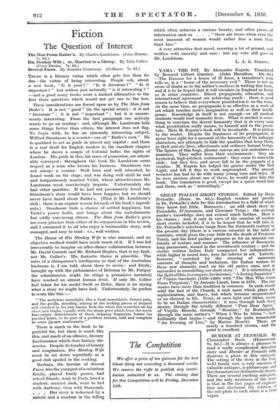GREAT ITALIAN SHORT STORIES. Edited by Decio Pettoello. (Bean. 8s.
6d.)—English readers are greatly in Dr. Pettoello's debt for this introduction to a field of which they know but little. Boccaccio ; an odd short story by Pirandello, D'Annunzio, and Giovanni Verge; average reader's knowledge does not extend' much .farther. Here is his chance ; and, if only in view of the .number of modern short stories included, it is to be hoped that he will take it. Dr. Pettoello's selections range from the thirteenth century to the present day (there is a curious misprint in the table of contents, which gives the year 1820 for the death of Frederic.) Tozzi), and his brief preface prepares us for an unusual con- tinuity of texture and manner. The influence of Boccaccio, long paramount, waned in the seventeenth century : and the stories written before Italy conquered her independence, while higher in moral tone, were far inferior in art. Latterly, however, " enriched by the crossing of numerous currents of thought and technique, the Italian writers let these new elements reset on the old native ones, and so succeeded in remodelling our short story." It is interesting, in the light of this, to compare, for instance, "A Jesting Inquisitor " of F'ranco Sacchetti (1330-1400) with "The Man Who Came From Purgatory," by Antonio Linati, born in 1878. The two stories have more than tradition in common. In each stands solid the fact of the Church, a rock upon which plays wit, sophistication, and fancy, but which remains unquestioned as an element in life. Irony, at once light and bitter, seems to be an Italian characteristic : it runs through both these stories, through the totally different " Poor Dear Agnes" of Virgilio Brocehi, through " Routine," by Bontempelli, through the same author's When I Was In Africa "—how brilliantly that begins !—and through the quite remarkable " An Evening of Lies," by Marino Moretti. There are
nearly a hundred stories, and the print is excellent.


























































 Previous page
Previous page